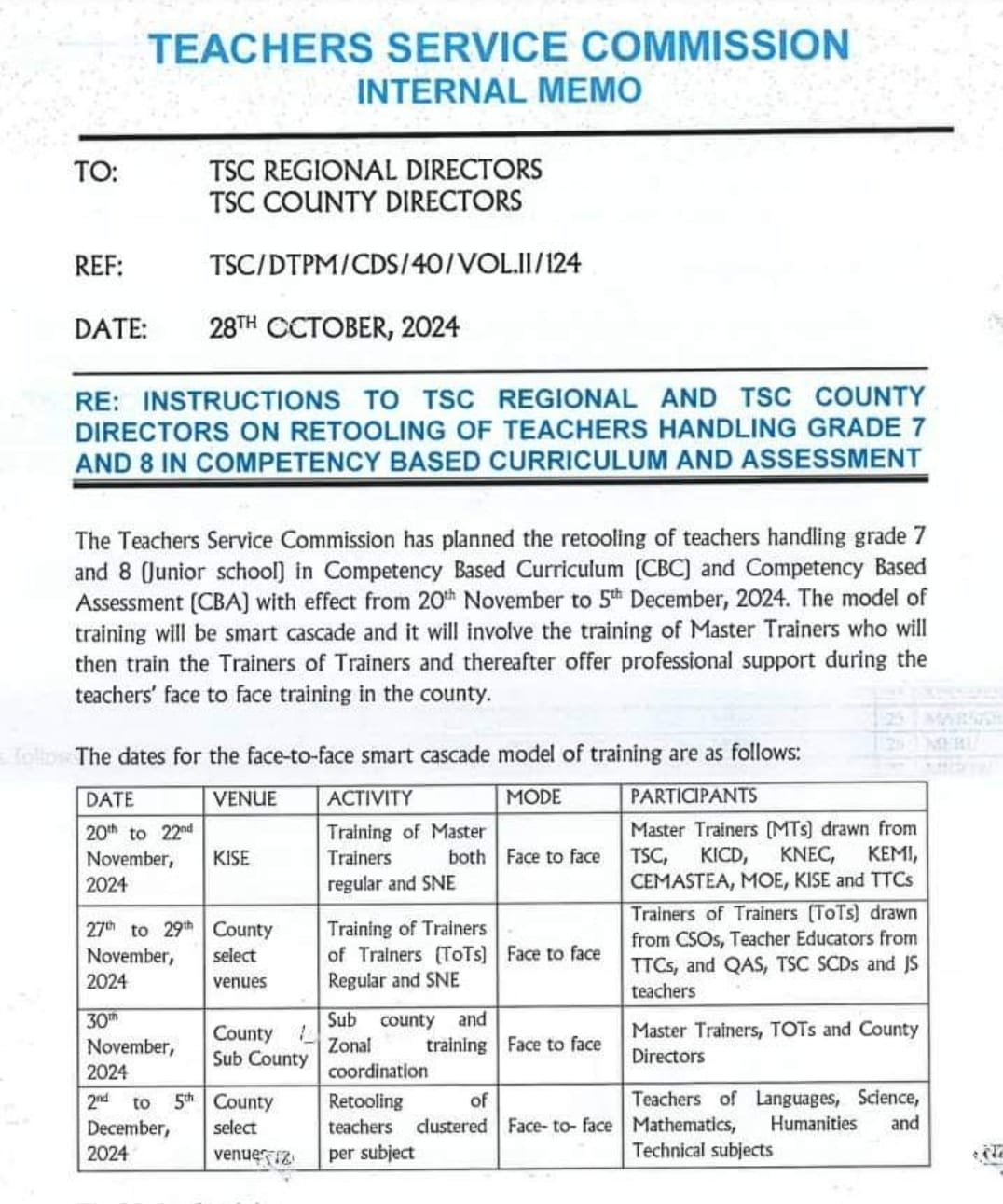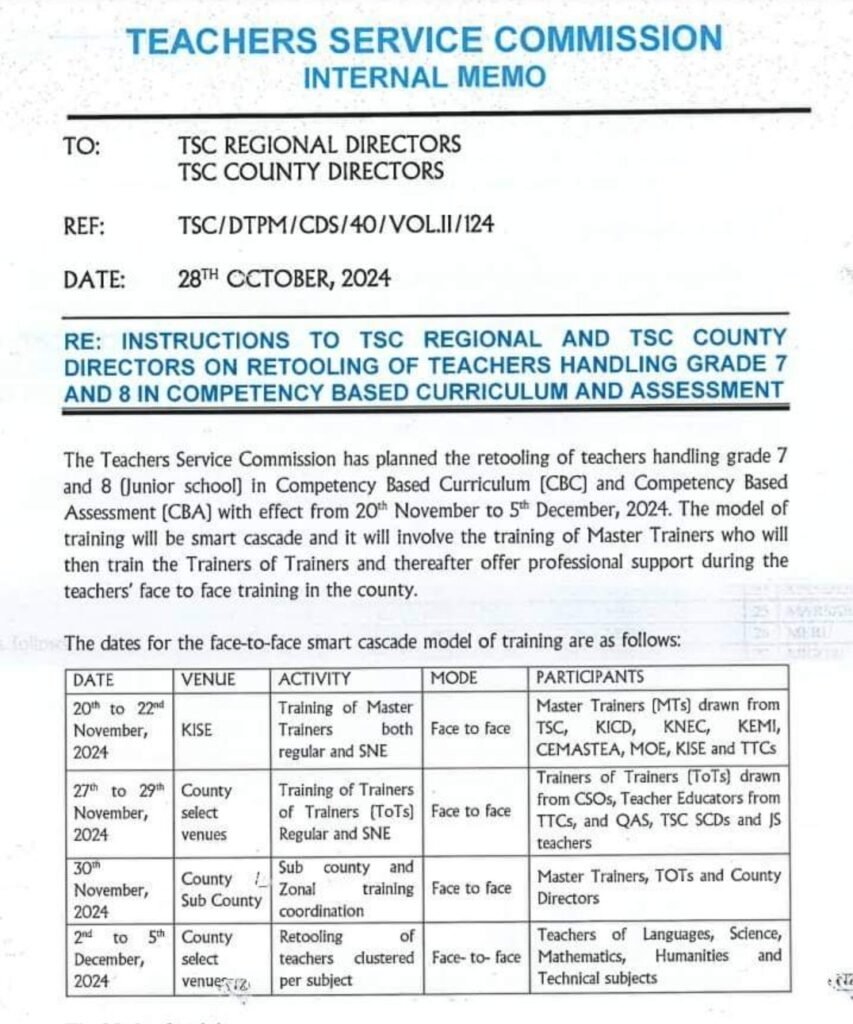Newly Recruited JSS Teachers: How Retooling Will Shape Their Teaching Journey from Day One

TSC circular on JSS retooling

Introduction
The recruitment of new Junior Secondary School (JSS) teachers is a significant initiative aimed at enhancing the educational system and ensuring that students receive quality instruction during their formative years. As these educators transition into their roles, it is crucial that they are equipped with the necessary tools and skills that will enable them to effectively engage with their students. A well-structured retooling program plays a fundamental role in this process, providing teachers with targeted training and development opportunities. The importance of such a program cannot be overstated, as it directly influences the effectiveness and confidence of newly recruited educators.
Retooling encompasses various training approaches specifically designed to address the unique challenges that JSS teachers may face in the classroom. This may include workshops focused on innovative teaching methodologies, classroom management strategies, and curriculum development. As these teachers begin their careers, the initial training they receive is essential in shaping their pedagogical approaches and teaching philosophies. By fostering an environment of continuous learning, the retooling program will ensure that educators can adapt to the evolving educational landscape and meet the diverse needs of their students.
In addition, this program serves as a support system, connecting new teachers with experienced mentors and fostering a community of practice. This collaborative approach helps to reduce feelings of isolation and enhances professional growth, ultimately benefiting the students. The synergy created through ongoing mentorship and skill enhancement ensures that new JSS teachers start their journey with a strong foundation, prepared to influence and inspire the next generation of learners. By investing in both recruitment and comprehensive retooling, educational authorities demonstrate their commitment to producing qualified, effective teachers who can thrive in their roles from day one.
The Advantage of Early Retooling
Early retooling for newly recruited Junior Secondary School (JSS) teachers plays a critical role in enhancing their teaching efficacy and overall confidence in the classroom. This foundational training is designed to equip educators with essential skills and knowledge crucial for implementing the JSS curriculum effectively from day one. By prioritizing early retooling, educational institutions ensure that teachers possess a thorough understanding of both pedagogical strategies and subject-specific content, enabling them to address diverse student needs appropriately.
One of the significant benefits of early retooling is the alignment it creates between teachers’ practices and the educational objectives outlined in the JSS curriculum. New teachers, when given the opportunity for professional development right at the beginning of their careers, are better prepared to meet the expectations of their roles. Training sessions designed to cover innovative teaching methods, classroom management techniques, and effective assessment strategies can impart the necessary tools for cultivating a conducive learning environment. As a result, teachers become more adept at engaging their students and fostering academic success.
Moreover, the confidence gained through early retooling can significantly influence teachers’ interactions with their students. Equipped with a robust skill set, teachers are more likely to experiment with different instructional approaches, create engaging lesson plans, and respond more effectively to classroom challenges. This not only enhances the classroom atmosphere but also inspires students to become active participants in their learning journey. Consequently, when teachers feel supported through retooling, they are more inclined to instill a sense of curiosity and motivation in their students.
In conclusion, the advantages associated with early retooling for newly recruited JSS teachers cannot be overstated. By investing in their professional development from the outset, educational institutions enhance the likelihood of successful teaching experiences that ultimately benefit both educators and their students.
What the Retooling Program Offers to New Teachers
The retooling program for newly recruited Junior Secondary School (JSS) teachers is designed to equip them with essential skills and knowledge that are vital for effective teaching. This program focuses on a comprehensive approach to pedagogical methods, ensuring that new educators can implement innovative teaching strategies that resonate with the diverse needs of their students. Participants will gain insights into various instructional techniques that promote active learning and critical thinking, enabling them to foster an engaging classroom environment.
One of the core components of the program is targeted training in curriculum implementation. This aspect emphasizes the necessity for teachers to be familiar with the grade 9 curriculum and understand the learning outcomes expected from their students. Through hands-on workshops and collaborative discussions, new teachers will learn how to adapt and align their lesson plans with the existing curriculum, ensuring that they meet educational standards while also addressing the unique learning styles of their students.
Classroom management is another critical skill covered in the retooling program. New educators often face challenges in maintaining a productive learning atmosphere, and this training will provide them with practical strategies to handle various classroom dynamics. By developing skills in conflict resolution, behavior management, and effective communication, teachers will be well-prepared to create a respectful and disciplined learning environment.
In addition to these fundamental skills, the program also includes opportunities for peer collaboration and mentorship. By connecting with experienced teachers and educators, new recruits can share experiences, gain valuable insights, and receive feedback on their teaching practices. This collaborative approach not only enriches their learning experience but also helps cultivate a supportive professional community.
Overall, the retooling program comprehensively equips new JSS teachers with the skills necessary to succeed from day one, ultimately contributing to a more effective educational experience for grade 9 students.
Setting New Recruits Up for Success
The introduction of newly recruited Junior Secondary School (JSS) teachers into the educational landscape is a critical juncture for both the educators and the students they will serve. Understanding the challenges of transitioning into a teaching role, comprehensive retooling initiatives have been designed to support these teachers effectively. Such programs are intent on fostering a seamless transition by equipping these educators with the necessary skills and confidence to thrive in their new environment.
Early training sessions focus on essential pedagogical strategies, classroom management techniques, and innovative teaching methods tailored to the unique needs of JSS students. Through these initial professional development workshops, new teachers gain insight into effective lesson planning, assessment strategies, and the integration of technology within their classrooms. This targeted training not only cultivates teaching competence but also plays a crucial role in fostering a sense of readiness among recruits.
Furthermore, mentoring plays a vital role in this transitional period. Pairing new recruits with experienced teachers amplifies their learning experience as mentors provide guidance, share best practices, and offer emotional support. This collaborative approach encourages an environment where novice educators can ask questions, seek clarification, and gradually build their self-efficacy. Knowledge sharing amongst colleagues enhances the learning culture within the school and fosters a spirit of collaboration that is essential for sustained educational improvement.
The long-term benefits of this comprehensive retooling initiative are substantial. When new JSS teachers are properly prepared from the onset, they contribute positively to the learning environment and exhibit enhanced teaching effectiveness. This ultimately leads to improved student outcomes and a more robust educational framework. By investing in the professional development of newly recruited teachers, we are not just supporting their success but also shaping the future of education for countless students.
Conclusion
As we have explored throughout this blog post, the process of retooling newly recruited Junior Secondary School (JSS) teachers plays a pivotal role in enhancing their teaching journeys from day one. This initiative not only equips teachers with vital skills and knowledge but also fosters their professional development, leading to improved pedagogical practices. The emphasis on continuous learning through retooling ensures that educators are well-prepared to meet the ever-evolving demands of the modern classroom.
The positive outcomes of retooling programs extend beyond just the teachers. When educators are effectively trained and supported, the quality of education they provide significantly improves. This directly benefits students, leading to richer learning experiences, enhanced academic performance, and improved overall educational engagement. By investing in the development of teachers, educational institutions are investing in the future of their students and the community at large.
Moreover, retooling initiatives contribute to creating a collaborative environment among teachers, where sharing best practices and resources becomes the norm. As new JSS teachers interact with experienced educators, they are likely to adopt innovative teaching strategies and adapt them to their unique classroom contexts. This collaborative spirit fosters a culture of continuous improvement and adaptation, which is essential for navigating the challenges within the educational landscape.
In summary, retooling is not just an essential training process for newly recruited JSS teachers; it is a transformative strategy that can reshape their teaching experiences and the educational outcomes for their students. By prioritizing retooling programs, education authorities can ensure that teachers are not only prepared for their roles but also empowered to make significant impacts in the lives of their students. Emphasizing such initiatives will undoubtedly lead to a more effective and dynamic educational system, benefiting teachers, students, and the society as a whole.






